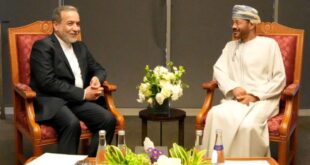 TEHRAN (FNA)- Tehran’s provisional Friday Prayers leader Ayatollah Emami Kashani insisted on Friday that Iran’s nuclear program is in line with international law and the West lacks any reason to pressure Tehran on its nuclear case.
TEHRAN (FNA)- Tehran’s provisional Friday Prayers leader Ayatollah Emami Kashani insisted on Friday that Iran’s nuclear program is in line with international law and the West lacks any reason to pressure Tehran on its nuclear case.
“The enemy has nothing to say about Iran’s peaceful nuclear position,” Kashani said while addressing a large congregation of worshippers on Tehran University campus on Friday.
The statement by Kashani came as Iran’s top nuclear negotiator Saeed Jalili in a letter to the EU foreign policy chief Javier Solana on October 6 accused the six major powers of “unreasonable behavior” over Tehran’s nuclear program.
“In the judgment of the world community, this unreasonable behavior is an indication of the lack of a clear response to the principled questions of the Islamic Republic of Iran,” Jalili said in the letter.
Jalili’s letter was addressed through Solana to foreign ministers of the five veto-wielding members of the Security Council, the United States, Britain, France, China, Russia, plus Germany.
Jalili said “logical behavior” by major powers could pave the ground for constructive talks to remove international concerns over the country’s nuclear work, Tehran Times reported.
“It is interesting … to see that in the course of talks … the other party (the major powers) … resorts to levers of pressure instead of offering answers to questions and trying to clear up ambiguities,” Jalili said.
Solana, representing the six powers, and Jalili last discussed Tehran’s nuclear program by telephone in August.
Kashani stressed that the latest International Atomic Energy Agency report has reaffirmed the non-diversion of Iran’s nuclear activities towards weapons production.
Reuters quoted a US official as saying that the six powers plan to hold a conference call later this week to discuss the letter and their possible response, but declined to say exactly when.
Iran has come under four UN Security Council resolutions for refusing to halt its uranium enrichment activities.
The United States accuses Iran of pursuing nuclear weapons and is leading international efforts to isolate Iran over its atomic efforts. Tehran says its activities are merely aimed at producing electricity for a growing population.
Tehran insists that as a signatory to the Non-Proliferation Treaty it has the right to access civilian nuclear technology.
Iran is under three rounds of UN Security Council sanctions for turning down West’s calls to give up its right of uranium enrichment, saying the demand is politically tainted and illogical.
Iran has so far ruled out halting or limiting its nuclear work in exchange for trade and other incentives.
Iran has shown no sign of compromise, vowing to resist US “bullying” to force it to abandon its right to develop peaceful nuclear technology, saying that renouncing its rights under the NPT would encourage world powers to put further pressure on the country and would not lead to a change in the West’s hardline stance on Tehran.
Iran has also insisted that it would continue enriching uranium because it needs to provide fuel to a 300-megawatt light-water reactor it is building in the southwestern town of Darkhoveyn as well as its first nuclear power plant in the southern port city of Bushehr.
The Islamic Republic says that it considers its nuclear case closed as it has come clean of IAEA’s questions and suspicions about its past nuclear activities.
Kashani, who sits on the Assembly of Experts, said, “Although the IAEA, which is the only organization authorized to investigate Iran’s nuclear activities, has confirmed that these activities are peaceful, the hegemonic powers, especially the United States, is seeking to pursue its goals by falsely branding the Islamic Republic terrorist.
“But Iran has proved in practice that not only it is not terrorist but it has been a victim of terrorism…The terrorists assassinated many important Iranian figures and even supported Saddam to start the imposed war against us,” said the cleric in reference to the Iran-Iraq war in the 1980s.
 Eurasia Press & News
Eurasia Press & News



